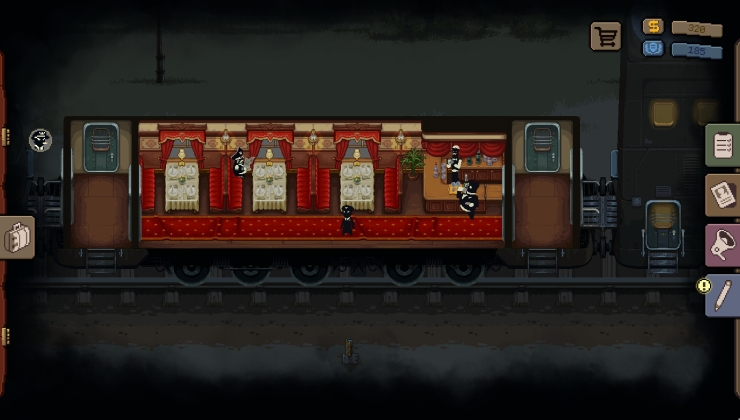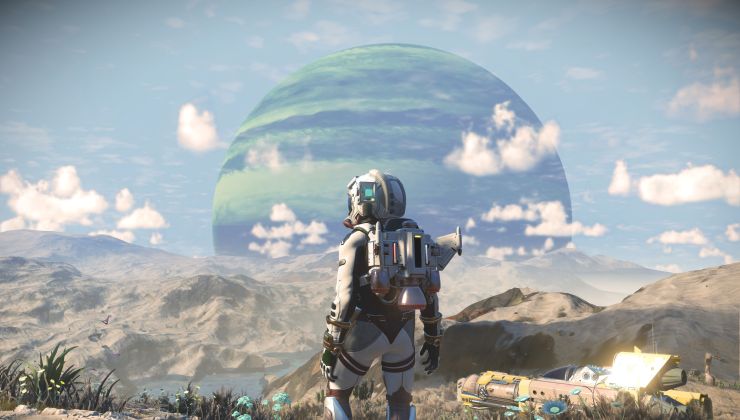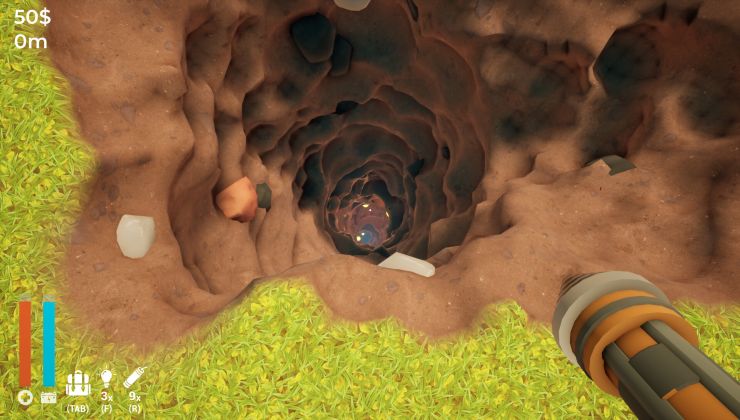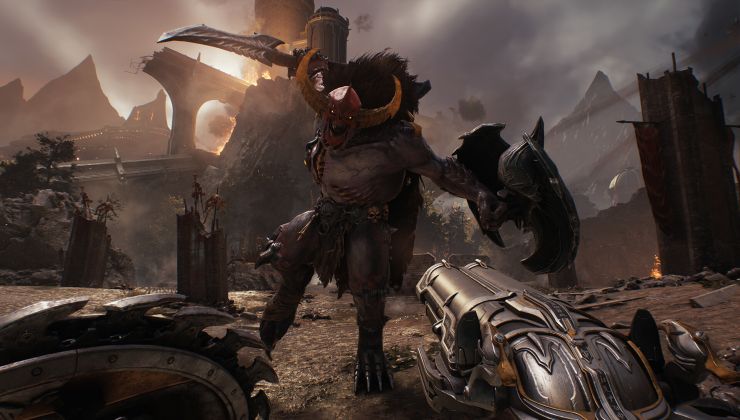Ron Gilbert is a name most in the game industry will know from the likes of Thimbleweed Park, and earlier works like The Cave while at Double Fine and they were even the producer on my all-time favourite RTS Total Annihilation. More than that, Gilbert was also the creator of the classic Monkey Island and it appears they're now attempting to switch to Linux.
Terrible Toybox, the actual team behind Thimbleweed Park are working on a new game and game engine too. They released Delores: A Thimbleweed Park Mini-Adventure in May 2020, as a small standalone title that acts as a prototype for their newer game engine. They even put up the source code for the Delores game on GitHub, although it's not under an open source license. It doesn't support Linux yet but that appears to be planned.
So what's the fuss about? They're switching their development flow to Linux and they've started blogging about the adventure too with a first post about their new hardware a few days ago. Seems they've settled on a Dell XPS 13 with Ubuntu Budgie. The question is: why are they doing it? As they said in the post:
My goal is to see how far I can get developing my new game on directly on Linux and not the Mac (I haven't developed on Windows in years). Can I ditch the Mac and go 100% Linux?
For working on the "game", this shouldn't be a problem once the engine runs on Linux. The few custom tools I use (Wimpy, for example) and all built from the same code the engine is, so once it's working under Linux, they should compile as well.
It's quite interesting to see more developers try out Linux, although not too surprising with how Apple is now again moving CPU architecture. Not just that though, as Apple have been getting more hostile for indie developers, with all sorts of extras being needed now and that's on top of the "Apple tax" that forces you onto their hardware. Gilbert mentioned this as well, with Apple being 'more paranoid and authoritarian' as time goes on.
Since their initial blog post it seems it went mostly okay, and they're continuing to learn and find the software they want. Will be fun to see how it all goes. Good luck, we're here if you need us Mr Gilbert and our Forum is always open. We're always happy to help game developers on Linux.
What are the Linux alternatives to Apple's Xcode? Last time I used it, was easy and fast to use - with incredible search capabilities. (This was years ago in Tiger.) I can't really find a comparable IDE for Linux.Have you looked at [JetBrains products](https://www.jetbrains.com/products.html#type=ide)? [AppCode](https://www.jetbrains.com/objc/) is probably the closest thing.
so as long as your simple in-house tools still work, why change?
Strangely enough, IMHO, for a "simple" game, taking an already existing game editor is good decision, both short-term and long-term.
It is a good short-term decision, because you can invest only in what's matter: your game. A game editor is much, much more than just SDL. SDL is the bare minimum, but then you need to create everything else for your game to work. I can't even list the number of parts there are in a game editor (and I've worked on 4 of them along my 14-year career). I would make a more detailed blog post one day, explaining all that in more details. So, TL;DR: it's a good short-term decision because you can focus only on your game: level-design, gameplay, UI, multiplayer, ...
But it is a good long-term decision as well, because if you want to create a game studio -- with more than just one game -- then you won't have to keep up with the latest trends. Imagine simply what's needed to do to migrate from OpenGL to Vulkan: it is a lot of time to invest into something with very little value for your game. Another example: let's say your first game works really well and you would like to port it to game consoles now. That is, again, a huge amount of resources to invest in order to port over Microsoft, Sony, and Nintendo. And another example: as your studio grow, you'll hire more people. If you're using have a well-known game editor, than you won't have to train your new hires, they'll probably already have heard of it.
Some 2D/pixel art game examples:
- [Broforce](https://www.broforcegame.com) is using [Unity](https://unity.com/)
- [Cuphead](http://cupheadgame.com/) is using [Unity](https://unity.com/)
- [Enter The Gungeon](https://store.steampowered.com/app/311690/Enter_the_Gungeon/) is using [Unity](https://unity.com/)
- [Dead Cells](https://dead-cells.com/) is using [Heaps.io](https://heaps.io/) (which I didn't know, but is still something they didn't develop on their own)
Edit:
That said, I agree that if your game tools already exist and are working, migrating to another game editor will definitely be painful, so I would not encourage doing the migration, unless the pros and cons are exhaustedly listed. I am indeed talking more about newly created game studios, doing their first game. I would advise them not to create their own game editor.
Last edited by Creak on 27 Jul 2020 at 10:03 pm UTC
Edit:Fair enough.
That said, I agree that if your game tools already exist and are working, migrating to another game editor will definitely be painful, so I would not encourage doing the migration, unless the pros and cons are exhaustedly listed. I am indeed talking more about newly created game studios, doing their first game. I would advise them not to create their own game editor.
Was always curios to tinker in that.
And since the game has a linux candidate was hoping the engine works under it as well.
It always bothered me about Debian that they have a "Don't break Debian" policy in the background. Why not? Breaking Linux and learning how to fix what I broke has gotten me more involved than I ever was in Windows. If I mistype something in /etc/fstab, it's my mistake to fix. I would hope that developers are always seeking to find the game engine that suits their needs best while giving them the required openness about bugs they encounter so they don't have to search through 12.000 lines of code just to find the missing ;...why does he need a new engine? just use godotI like Godot but it's not the answer to everything and it doesn't fit everyone's needs. Why does anyone make their own stuff? To learn, to have full control and know exactly what it's doing. Just telling a developer to "use x game engine" isn't particularly helpful.
The "Don't Break Debian" slogan is about mixing in foreign repositories with Debian incompatible packages and then expecting nothing to go wrong. They don't really mean, "Don't break Debian"; They mean, "Don't break Debian and then blame Debian (us)."
Last edited by CFWhitman on 28 Jul 2020 at 1:00 am UTC
yeah i know, but his games arent really that complexIf you're sticking to one style, the knowledge and control of the codebase a custom engine gives you tends to outweigh the flexibility of a general-purpose one.
i understand it for cyberpunk or other huge open world games, but a pixel style point and click.... i dont know... doesnt seem to by very economically
he makes 2D pixel art games. how flexible do you have to be for that?
if you need special water effects, or physics, or lightning, or trees... anything..... i would understand
but why all the work for

Last edited by mylka on 28 Jul 2020 at 1:01 am UTC
yeah i know, but his games arent really that complexIf you're sticking to one style, the knowledge and control of the codebase a custom engine gives you tends to outweigh the flexibility of a general-purpose one.
i understand it for cyberpunk or other huge open world games, but a pixel style point and click.... i dont know... doesnt seem to by very economically
he makes 2D pixel art games. how flexible do you have to be for that?
if you need special water effects, or physics, or lightning, or trees... anything..... i would understand
but why all the work for
I think they started the engine after Thimbleweed Park, so it's for the next big ;-) thing, no?
Terrible Toybox, the actual team behind Thimbleweed Park are working on a new game and game engine too.
I couldn't find any information about this.
Liam, did you deduce that from the fact that Ron is working on a new engine
or did he explicitly mentioned working on a new p&c game? :)
Even more exciting to me than Ron is trying out Linux now (which is great) is this part:
Terrible Toybox, the actual team behind Thimbleweed Park are working on a new game and game engine too.
I couldn't find any information about this.
Liam, did you deduce that from the fact that Ron is working on a new engine
or did he explicitly mentioned working on a new p&c game? :)
They said this in the Dolores Steam forums and they also said while Dolores doesn't support Linux, their engine and their next game will.
Even more exciting to me than Ron is trying out Linux now (which is great) is this part:
Terrible Toybox, the actual team behind Thimbleweed Park are working on a new game and game engine too.
I couldn't find any information about this.
Liam, did you deduce that from the fact that Ron is working on a new engine
or did he explicitly mentioned working on a new p&c game? :)
They said this in the Dolores Steam forums and they also said while Dolores doesn't support Linux, their engine and their next game will.
Great! \o/
My brain just BASIC's "SYNTAX ERROR?" on the whole thing... If I break something, I will be responsible for fixing it. Seems only natural to me. I don't blame Debian if I pull in other repos and break stuff. Can't figure out why there are people who do... :(It always bothered me about Debian that they have a "Don't break Debian" policy in the background. Why not? Breaking Linux and learning how to fix what I broke has gotten me more involved than I ever was in Windows. If I mistype something in /etc/fstab, it's my mistake to fix. I would hope that developers are always seeking to find the game engine that suits their needs best while giving them the required openness about bugs they encounter so they don't have to search through 12.000 lines of code just to find the missing ;...why does he need a new engine? just use godotI like Godot but it's not the answer to everything and it doesn't fit everyone's needs. Why does anyone make their own stuff? To learn, to have full control and know exactly what it's doing. Just telling a developer to "use x game engine" isn't particularly helpful.
The "Don't Break Debian" slogan is about mixing in foreign repositories with Debian incompatible packages and then expecting nothing to go wrong. They don't really mean, "Don't break Debian"; They mean, "Don't break Debian and then blame Debian (us)."
Have you actually played the game and experienced the character switching and multi-character narrative? Thimbleweed Park is fairly ambitious in some aspects and it doesn't surprise me they want a custom engine. Your comment comes across as particularly thoughtless by posting a pic of pixel art and then saying something like "how hard can it be". Just because you don't see or understand the need, it's still there.yeah i know, but his games arent really that complexIf you're sticking to one style, the knowledge and control of the codebase a custom engine gives you tends to outweigh the flexibility of a general-purpose one.
i understand it for cyberpunk or other huge open world games, but a pixel style point and click.... i dont know... doesnt seem to by very economically
he makes 2D pixel art games. how flexible do you have to be for that?
if you need special water effects, or physics, or lightning, or trees... anything..... i would understand
but why all the work for

So many times I've played a game where the studio chose to use an off the shelf engine and it really shows. Often it's easy to even spot the engine the studio chose from it's characteristic behaviors and flaws. This can happen with custom engines too. They're not perfect and it's also obvious when a studio is clinging to their old beloved engine tech.As a game developer in a AAA games company, and although we have our own game engines, I am still not convinced that doing your own game engine is a good thing. Game engines have become beasts, it is not just a matter of graphics, it is also about sound, AI, inputs, physics, animation, data management, etc.. and, on top of that, a whole editor for the game devs and artists to integrate their stuff in the engine. That why it is preferable to talk about "game editor" rather than "game engine". The engine is just a small part of the whole piece.yeah i know, but his games arent really that complexLook at it from the other side. For someone developing many different styles of game, gaining some knowledge of, and competence in, a general-purpose engine like Godot, Unity, or Unreal makes a lot of sense. But they're jacks of all trades. If you're sticking to one style, the knowledge and control of the codebase a custom engine gives you tends to outweigh the flexibility of a general-purpose one. And because the games aren't that complex, it isn't too hard to do. (It's beyond me, but if you know what you're doing...) I've seen single-person studios making point-and-click adventures in their own engines.
i understand it for cyberpunk or other huge open world games, but a pixel style point and click.... i dont know... doesnt seem to by very economically
Developing these kind of game editors cost millions of dollars a year and it is, of course, never finished. On the other side, if you choose to use an existing game editor (Unity, Unreal, Godot, ...), you get all the new fancy features with each upgrade and you can focus only on what's important: your game.
As a developer, I understand the urge to own and control your own code but, to make a poor analogy, developing your own game editor to make your game is a bit like developing your own Photoshop to create your textures.
Edit:
I would add that open source is, to me, the perfect compromise. You don't have to develop everything just by yourself, but you still have control over the code. When Godot will get to a point where it would compete with Unity and Unreal, I think this will be a game changer (pardon the pun)
I think the point being that there isn't a one fit right answer when choosing a toolchain for a software project. It really depends on what you want to do and what tools, if any, support that out of the box (or easily modded).
Last edited by randyl on 28 Jul 2020 at 4:03 pm UTC
What are the Linux alternatives to Apple's Xcode? Last time I used it, was easy and fast to use - with incredible search capabilities. (This was years ago in Tiger.) I can't really find a comparable IDE for Linux.
There's a forum thread with people's thoughts on various IDEs. Might be worth a read through:
https://www.gamingonlinux.com/forum/topic/2425
I've never used Xcode personally (never owned a Mac, never done development for one), so I can't comment on anything with the same features or interface, but maybe you'll get an idea for something to try.
Thanks for the link. Looks like there are a lot more options than I had known about!
What are the Linux alternatives to Apple's Xcode? Last time I used it, was easy and fast to use - with incredible search capabilities. (This was years ago in Tiger.) I can't really find a comparable IDE for Linux.Have you looked at [JetBrains products](https://www.jetbrains.com/products.html#type=ide)? [AppCode](https://www.jetbrains.com/objc/) is probably the closest thing.
Those look really interesting. But they are for macos :)
Whoopsie daisy, you are right. AppCode is only available for macOS. [CLion](https://www.jetbrains.com/clion/) on the other hand is for Linux.Have you looked at [JetBrains products](https://www.jetbrains.com/products.html#type=ide)? [AppCode](https://www.jetbrains.com/objc/) is probably the closest thing.Those look really interesting. But they are for macos :)
I have personally used IntelliJ IDEA (Java), Rider (C#, .NET, Unity engine), PhpStorm, and Android Studio on Linux. They are all based on the same platform, with different plugins installed. I suggest you try the free IntelliJ IDEA Community Edition, or/and the trial versions. Definitely worth the money if you are using them professionally. They also have free versions for students and open-source developers.
Whoopsie daisy, you are right. AppCode is only available for macOS. [CLion](https://www.jetbrains.com/clion/) on the other hand is for Linux.Have you looked at [JetBrains products](https://www.jetbrains.com/products.html#type=ide)? [AppCode](https://www.jetbrains.com/objc/) is probably the closest thing.Those look really interesting. But they are for macos :)
I have personally used IntelliJ IDEA (Java), Rider (C#, .NET, Unity engine), PhpStorm, and Android Studio on Linux. They are all based on the same platform, with different plugins installed. I suggest you try the free IntelliJ IDEA Community Edition, or/and the trial versions. Definitely worth the money if you are using them professionally. They also have free versions for students and open-source developers.
Those look pretty neat, and I think CLion is cool but a tad too pricey for me.
I was looking mainly for C/C++ support and would probably purchase CLion, but most of my [opensource] projects aren't actually built to make money!
Whoopsie daisy, you are right. AppCode is only available for macOS. [CLion](https://www.jetbrains.com/clion/) on the other hand is for Linux.Have you looked at [JetBrains products](https://www.jetbrains.com/products.html#type=ide)? [AppCode](https://www.jetbrains.com/objc/) is probably the closest thing.Those look really interesting. But they are for macos :)
I have personally used IntelliJ IDEA (Java), Rider (C#, .NET, Unity engine), PhpStorm, and Android Studio on Linux. They are all based on the same platform, with different plugins installed. I suggest you try the free IntelliJ IDEA Community Edition, or/and the trial versions. Definitely worth the money if you are using them professionally. They also have free versions for students and open-source developers.
Those look pretty neat, and I think CLion is cool but a tad too pricey for me.
I was looking mainly for C/C++ support and would probably purchase CLion, but most of my [opensource] projects aren't actually built to make money!
I know it's probably not your comfort zone, and so it might very well be unappealing, or simply not your preferred way of working, but with C/C++ I do recommend considering setting up a language server protocol (LSP) of some kind (I use rtags). Quite a few editors support the protocol, so you get all the benefits of code analysis, referencing, etc, for exactly the code base you're working on, with the build options you're using (although rtags for example relies on clang, not gcc). Assuming your build system and IDE are not tied together too (even then, a proper IDE would at least allow a makefile or something to be used).
I use this with emacs for example, but there's vim, qt-creator also supports it I believe, eclipse, atom, visual studio code, etc. It might open up other avenues for you to explore that way.
Some of that stuff KDevelop does, but that looks like it on steroids - so I may come to that. Thanks for the heads up.
Last edited by DigitalSin on 1 Aug 2020 at 3:43 am UTC
As a developer, I understand the urge to own and control your own code but, to make a poor analogy, developing your own game editor to make your game is a bit like developing your own Photoshop to create your textures.
No no, that is an EXCELLENT analogy.
I say that as someone who once well victim to it myself.
These days for modern 3D games you need things like inverse kinematics for positioning hands on weapons, tools for generating navigation meshes from level layouts, lightmap bakers and global illumination solutions, soft body simulation for character hair or cloth to move in the wind, ability to stream in level content in separate threads, and of course if you were writing an engine from scratch today you would be using Vulkan..
.. the idea of making a game engine for a game in 2020 is madness unless all you're making is a simple 2D game. Even then I can't help but ask 'Why?'. What exactly do you think your 2D engine is going to do that some other game engine that has been worked on by more people for longer won't do?
Last edited by gradyvuckovic on 2 Aug 2020 at 12:27 am UTC











 How to set, change and reset your SteamOS / Steam Deck desktop sudo password
How to set, change and reset your SteamOS / Steam Deck desktop sudo password How to set up Decky Loader on Steam Deck / SteamOS for easy plugins
How to set up Decky Loader on Steam Deck / SteamOS for easy plugins
See more from me